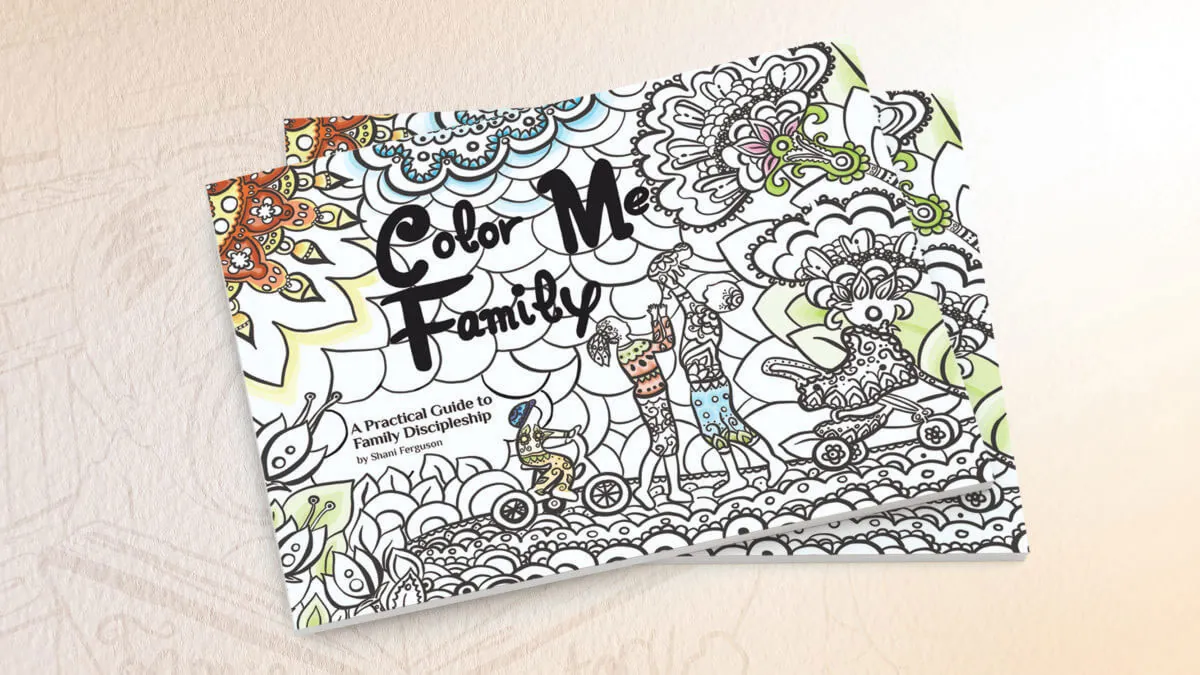
It may feel less exciting that a street protest (although shutting down our kid’s protests can be its own adventure) and it may feel less influential than filing a legal petition for one cause or another. But rest assured, there is no force more powerful than a family being used by God for generation after generation.
For the past several months we have delved deep into the Israeli political scene. As usual, the goings on in tiny Israel’s government are strangely on everyone’s radar—for good or for bad. However, as crucial as it is that we are aware and actively praying for Israel’s leaders, unless you have personal friends in power, there are limitations to the direct influence we can have on today’s leaders. We can however, have direct and powerful influence on our immediate surroundings—and that begins at home with our close friends and families. It may feel less exciting that a street protest (although shutting down our kid’s protests can be its own adventure) and it may feel less influential than filing a legal petition for one cause or another. But rest assured, there is no force more powerful than a family being used by God for generation after generation. As the building blocks of a society are made of the family unit, it seems clear that a nation can prosper with healthy families even if the government is problematic. But it will have a much harder time succeeding with an incredible government and a nation of broken, dysfunctional and hurting families. Therefore, in the midst of the continued unrest in Israel, we felt it right to highlight some topics from a book I wrote called Color Me Family. We hope it blesses you and offers hope that despite its messy nature, God designed the building of a healthy family to be a doable task. You can find out more about it at the end of the article.  A few years ago, an Israeli friend of mine posted a question on social media. It read, “As Jews, is there anything we have to offer the world other than the fact that we are chosen?” It was a sincere question since scripturally being Jewish means people who bless you are blessed, and those who don’t—well, they miss out. The question was, “Aside from God’s supernatural blessing He promises to anyone who blesses the Jews, is there anything we as Jews can physically give back to the world?” The answer came to me instantly—family. The foundation for a healthy society is a multi-generational healthy family. Jews as a people and culture excel at building families and can give back to the world by spreading the Biblical family model they have taught their children for thousands of years. When God chose Abraham, He did so because He knew Abraham would be a good father. Abraham loved God, but so did others before him. What made Abraham unique was his ability to not only train his children but also teach them to train their children and their children’s children. God had a lot planned for the human race. No one person would live long enough to experience and tell the entire story of mankind. God had to choose someone who could pass on the fundamental structure of society (family) and the story of God as it progressed with each generation. Jews have spent thousands of years proving that a nation built on families can survive war, exile and numerous attempts of extermination. Right now, the world is struggling to even define what the word “family” means. This book is a collection of principles derived from various parts of Scripture and Jewish culture. We hope these tools will help turn your daily grind of family living into a fantastic adventure—as they have ours. Everyone’s surroundings and challenges are different; what’s important is that you grasp the overall principles presented so you can adapt them to your unique family and parenting style. This book isn’t so much a commentary on how to raise your children as it is how to grow together as a family.
A few years ago, an Israeli friend of mine posted a question on social media. It read, “As Jews, is there anything we have to offer the world other than the fact that we are chosen?” It was a sincere question since scripturally being Jewish means people who bless you are blessed, and those who don’t—well, they miss out. The question was, “Aside from God’s supernatural blessing He promises to anyone who blesses the Jews, is there anything we as Jews can physically give back to the world?” The answer came to me instantly—family. The foundation for a healthy society is a multi-generational healthy family. Jews as a people and culture excel at building families and can give back to the world by spreading the Biblical family model they have taught their children for thousands of years. When God chose Abraham, He did so because He knew Abraham would be a good father. Abraham loved God, but so did others before him. What made Abraham unique was his ability to not only train his children but also teach them to train their children and their children’s children. God had a lot planned for the human race. No one person would live long enough to experience and tell the entire story of mankind. God had to choose someone who could pass on the fundamental structure of society (family) and the story of God as it progressed with each generation. Jews have spent thousands of years proving that a nation built on families can survive war, exile and numerous attempts of extermination. Right now, the world is struggling to even define what the word “family” means. This book is a collection of principles derived from various parts of Scripture and Jewish culture. We hope these tools will help turn your daily grind of family living into a fantastic adventure—as they have ours. Everyone’s surroundings and challenges are different; what’s important is that you grasp the overall principles presented so you can adapt them to your unique family and parenting style. This book isn’t so much a commentary on how to raise your children as it is how to grow together as a family.
UNDERSTANDING RHYTHMS
Most cultures have yearly cycles such as annual holidays or special days of remembrance. In Scripture, there are also monthly and weekly cycles. When establishing your family’s unique rhythms, it helps to view each week as a cycle, and each cycle ends with a special day of family rest. If one week goes wrong, it’s behind you, and a new week lies before you with fresh expectancy and opportunity. The idea of a rhythm is predictability and repetition. Rhythm builds expectancy and familiarity. Rhythm in a song helps the musicians and the audience know when to play, clap, dance, and sing. Family rhythms are activities that help family members function better as a team and benefit from each other as a family unit. It’s important to remember that each family is in different life stages. What might work for a family with teenage kids may not work for a family with a toddler and a newborn. You may look at these family rhythms now and not be able to imagine them fitting your lifestyle, and then in a few years suddenly something clicks, and it seems to fit your family like a glove. Family rhythms can repeat weekly, monthly or annually. Each page in this book is its own section. We encourage you to take your time considering each topic and not attempt to incorporate them all at once into your life. We spent years developing our family rhythms, and there were plenty of times where work, sickness or even a birthday party would throw us off. This is why it’s called a family rhythm and not a family schedule. If your kids are well into their teens, don’t be discouraged if at first, they look at you sideways when you come to them with your desire to incorporate new family rhythms. It may feel like an entirely new concept, but the truth is, your family members already have personal rhythms. School, work, after-school activities, etc. are all individual rhythms designed for fulfilling our lives as individuals. Family rhythms are designed to fulfill our lives as a family (team). We are unendingly grateful to come from families with parents and grandparents on both sides who love and follow the Lord. However, we know families today come in all shapes and sizes, and circumstances don’t always make living life together easy. We hope that no matter what state your family is in today, you will be able to apply these rhythms to your life. As you incorporate these rhythms (and any others you come up with!), we hope you grow as a family and come to cherish the traditions and memorable moments you develop from these rhythms. We look forward to hearing about your experiences and hope you will share them with us as you discover your family’s inner heartbeat. 
PASS IT ON
While many modern Western families may send their kids off to college with quality high school book knowledge, traditional Jewish families will more than likely send their children to college with book knowledge as well as years of experience in the family trade. Jewish people worldwide are often known for their successful businesses. The secret to their success is not just good business sense—it is that Jews think multi-generationally. Whether they were exiled to South America, Europe or some sandy hill in the Middle East, they inevitably prospered as a community because they raise their families to succeed 100 years from now. Western Christianity traditionally avoids planning far into the future. Perhaps because people don’t want to be perceived as faithless by planning past the potential return date of the Messiah. Once, while praying with our daughters for their future husbands and children, we were interrupted by a man who told us we were wasting our time. “The Lord will return before they are old enough to marry,” he said. We ignored him. The truth is, while the Lord could return at any time, the Scriptures tell us the wise servants will be caught working—not waiting around. Like in golf or baseball, only when you focus your efforts on swinging past the ball do you succeed at hitting it where it needs to go. It isn’t uncommon in Israel for kids to go to work with their parents after school or during the summer months when they are out of school. Though I’m sure it doesn’t make for a streamlined workday, you’d be amazed how much kids pick up as they observe the inner dealings of a business—and how quickly they can begin helping out. One of the latest trends in reality shows today is showcasing multi-generational families. Whether it’s Swamp People, Duck Dynasty or American Restoration (the list goes on), the shows in essence chronicle the story of the family trade. Show members often brag of the generations of wisdom and experience they bring to their trade. The seemingly dull life of hunting alligators, building duck calls or making good ole American junk beautiful again becomes fascinating. While most pop culture movies portray the stereotypical teens who are trying to “find themselves” amidst life with parents who “just don’t understand,” the reality is that when kids are brought up with a family vision, they take pride in being a continuation of their family legacy. Whether you have expertise in a particular field or have good domestic skills, passing on tried and true techniques to your children will give them an edge in life. Even if you don’t have many skills to be proud of—don’t fret. We always keep our eyes out for experience our friends and extended family may possess. Got an uncle who’s an expert at fishing? Or an aunt who can sew up a dress in a jiffy? How about a friend who knows all the secrets of high-class etiquette? Living in Jerusalem, we often have friends from around the world who come to stay for a month or two. While they are here, we try to introduce our kids to their hobbies. Whether it be an athletic activity, some form of art, a particular recipe, or even learning a few words or songs in our guest’s native tongue, we encourage them to pass on their skills to our kids. Subsequently, our kids are regularly exposed to many cultures and world perspectives at a young age. It’s important to remember—passing on generational wisdom is not just about a skill set. It’s passing on the family vision. (See the “Family Quizzes” section for more on this!) You are a part of a long story. Your ancestors went through so much to survive. Other family lines did not make it; yours did. Your life is the continuation of the story of their life—as will your children’s lives be the continuation of your story. Your family’s story and legacy are special, and God has watched it all unfold—so think as far back as you can and pass it on!
FAMILY QUIZZES
Finding one’s place in this world is a quest many spend years pursuing. People do many foolish things trying to feel like they belong. While we can’t promise you your children will make it through their teen years without doing something dumb, we can guarantee you that children who view themselves as a part of a greater story are less likely to feel the need to prove themselves to their goofy friends. Children may not be able to discover their full destiny by the time they graduate from high school, but they should definitely understand their heritage and legacy well before they get their diploma.  Last year, our daughter’s third-grade class discussed the topic of family history. During the discussion, the teacher commented on how surprised she was that our daughter knew so much about her family history. Our daughter explained how we often discuss our family history in quiz form at mealtime. At dinner that night, she proudly explained how everyone in her class was jealous of her because she knew so much about herself—and because we were the only family in her grade who still ate dinner together on a regular basis. Traveling in various parts of the world, I noticed when people were asked to tell a bit about themselves, they almost always began with the location and date they were born. They start there because their universe began the day they took their first breath. In contrast, when Jews share about themselves, they often start with something like, “My grandparents came from…” giving a few minutes of background and then moving on to when they were born. They do this because the Jewish identity is not individual. Who we are is heavily- influenced by generations of Jewish heritage, and leaving that information out is leaving out a big part of who we view ourselves to be. Don’t think that teaching your kids the family history needs to be a solemn fireside annual occasion. Teaching family history is better done in bite-size increments and can be a total blast. Some stories require background and details, but many family facts can be handed out in the form of what we call “family quizzes.” This is when we share snippets of information about our family history in question form and see who knows the answer. The question will be asked several times throughout the year to see who remembers. Questions can be from a general, “Who in the family has at least three siblings?”, with the answer being several people. Or the questions can be more specific, like, “Who in the family served in the military of two different nations, and what were those nations?” Keep the topics age appropriate, but questions can also be about the less beautiful times in the family’s history. “Who burned down the family house and ran off with the insurance money?” is an actual quiz question in our family. The question can lead into a more detailed story, which in the case of the burned down home concludes with a powerful testimony of redemption later in life. You’ll be surprised how many stories from your own life come rushing back to memory. We often play this at dinner time, but road trips or any setting like the doctor’s office where you’re stuck sitting together works just as well.
Last year, our daughter’s third-grade class discussed the topic of family history. During the discussion, the teacher commented on how surprised she was that our daughter knew so much about her family history. Our daughter explained how we often discuss our family history in quiz form at mealtime. At dinner that night, she proudly explained how everyone in her class was jealous of her because she knew so much about herself—and because we were the only family in her grade who still ate dinner together on a regular basis. Traveling in various parts of the world, I noticed when people were asked to tell a bit about themselves, they almost always began with the location and date they were born. They start there because their universe began the day they took their first breath. In contrast, when Jews share about themselves, they often start with something like, “My grandparents came from…” giving a few minutes of background and then moving on to when they were born. They do this because the Jewish identity is not individual. Who we are is heavily- influenced by generations of Jewish heritage, and leaving that information out is leaving out a big part of who we view ourselves to be. Don’t think that teaching your kids the family history needs to be a solemn fireside annual occasion. Teaching family history is better done in bite-size increments and can be a total blast. Some stories require background and details, but many family facts can be handed out in the form of what we call “family quizzes.” This is when we share snippets of information about our family history in question form and see who knows the answer. The question will be asked several times throughout the year to see who remembers. Questions can be from a general, “Who in the family has at least three siblings?”, with the answer being several people. Or the questions can be more specific, like, “Who in the family served in the military of two different nations, and what were those nations?” Keep the topics age appropriate, but questions can also be about the less beautiful times in the family’s history. “Who burned down the family house and ran off with the insurance money?” is an actual quiz question in our family. The question can lead into a more detailed story, which in the case of the burned down home concludes with a powerful testimony of redemption later in life. You’ll be surprised how many stories from your own life come rushing back to memory. We often play this at dinner time, but road trips or any setting like the doctor’s office where you’re stuck sitting together works just as well. 
SPECIAL MEAL. SPECIAL DAY.
The Day—The Sabbath day of rest is somewhat of a controversial topic, and many theological books have been written about it. We’ll avoid that here and simply point out that the seven-day week—ending in a day of rest—has been a natural cycle since the creation of the world. Whether you decide to dedicate one day a week for rest because it’s rejuvenating, or you understand the mystery behind the holiness of the Sabbath day, the end result should be the same—one day a week dedicated to resting and getting closer to God and your loved ones. The purpose of this special day is not to make a long list of things you can’t do, but rather make a list of things you finally get to do because you have set aside everyday distractions. Occasionally, we spend this day secluded for the purpose of prayer or much-needed sleep. But mostly, our Saturdays are dedicated to having quality time together. Some Saturdays we stay home and play games; other Saturdays, our family goes out and meets up with friends. The Meal—When we had a nursing infant and several toddlers running around, dinner was more of a survival activity. Nowadays, our family eats dinner together an average of five days a week. If you can only manage once a month, that is still a step in the right direction. Sometimes we manage every night that week; other weeks we have a project deadline and manage only two nights that week. Friday night, we eat a special meal to welcome the Sabbath day of rest. The kids recognize it’s a unique occasion and love to dress up. We often invite company over and cook something extra special. We begin the meal with the traditional candle lighting and breaking of bread. We then sing traditional Hebrew songs and the men speak blessings over their wives and children. None of these activities are required; they are just a traditional way Jews bless their families regularly and celebrate the arrival of the best day of the week. In Israel, having this meal on Friday to welcome the Sabbath is easy since most things shut down. We understand that some people are required to work weekends and we therefore present this in generic form so it can be adapted to each family’s ability. Eating together has always been an important part of Jewish culture. Although it may feel insignificant because we eat every day, filling your body with nourishment alongside others creates a unique bonding experience. You can make a significant statement of how you feel about someone simply by accepting or refusing to eat with them. Meals together are also an important time of training our kids. Every meal we talk a little about what’s going on in each of our lives. We ask the kids about their favorite school activities, best friend status (this changes on a weekly basis), who are the best and worst teachers, and engaging spiritual topics we as parents had discussed earlier in the day. The “special meal, special day” principle creates a space for you to spend time on important things rather than being forever drowned by the urgent. Give it a go, and you may find this rhythm becomes the highlight of your week. 
TIME TRAVEL
It’s the fantasy of most every child in the modern era to go back in time and change a bad day—or go forward in time and know what life will be like decades or even centuries from now. But while time-travel remains a favorite theme for books and movies, we’ve found time-travel in the mind to be an effective tool for strengthening the family. We call it “time-traveling” because we are in essence helping our kids live out scenes in their future life. Kids are notorious for not thinking past their next birthday—or even next week—and their actions demonstrate this sad fact. When I was in the 4th grade, I remember looking at a high schooler and consciously thinking, “I’ll never make it to the 12th grade.” It was just too far away in my mind. Then when I did make it to high school, I thought, “I’ll never grow old enough for college or marriage or children.” Each phase of life seemed to catch me by surprise, and I only considered what I should do about each phase when I arrived at its doorstep. Time-traveling with your kids not only prepares them for their future—it can dramatically affect how they live in the present. When our youngest daughter was only three, she was going through a phase of defiance. For being only three, she was remarkably skilled at playing the adorable angel when we were around and then doing her deeds on the sly. As adults we wanted to appeal to her reason, to show her that the path she was on would have dire consequences in the future. But she was three, so we had to present it to her in a way she could understand. We had already spent much time sowing the concepts of lineage to our kids. “One day you’ll be a mom/dad,” was a common topic in our home. The conversations included how many children they’d like to have, what country they would want to live in and who would share a bedroom with who. What they hadn’t fully considered was their own role as the parent—one that would have to enforce rules. “One day you are going to be a mother/father,” we explained to our daughter. “Do you want your child to disobey and disrespect you?” You could see it in her eyes as her mind began to imagine herself a mother with children running around. Walking through the situation mentally as a mother, she somehow grasped what it would feel like being on the receiving end of a disobedient child. “No!” she responded in a surprisingly serious tone. Often, when we discipline our kids this conversation repeats itself. (The older the child, the more in-depth this conversation can be.) It’s more than the standard approach of thinking of others as more important than yourself. For children, considering the feelings and life of others is difficult. What clicked for our kids was lifting their gaze from the now to the future. Since we raise our kids knowing they are parents-in-training, they were able to tap into their future feelings and let it affect the decisions they made in the present. Because they valued themselves as future parents, they were able to value their current parents as well. We’ve been pleased to see how this mental time-hopping has also been useful for improving their behavior in other areas. 
THE NON-SPIRITUAL LIFE
I once spoke to a godly man who was raised in an atheist home. He encountered God later in life but explained that even through his teen years he always had a good relationship with his parents. He and his family never prayed together, but they spent much quality time with each other. It is said a family that prays together stays together, and prayer is a definite must for a healthy spiritual family life. And yet, it is a sad fact that many religious families produce kids who aggressively reject their parents and family beliefs. You could present many reasons for this phenomenon, but we’ll focus on one, often overlooked reason. Many devout believers genuinely want their kids to turn out as devout as they are. There is no greater accomplishment for us as parents than growing our kids into adults who know and love God. In our pursuit of that goal, it’s easy to assume that the more time spent doing “holy” activities (daily devotions, attending services, helping the needy, etc.), the better. However, if the majority of “family time” together is spent on spiritual pursuits, there is little time for family members to sit back, relax and get to know each other as people. You simply cannot overrate the bonding that occurs when you have fun together. To the highly motivated types who realize we only have so much time on this earth, playing a game of cards or throwing a ball (rolling one if the kids are small) screams of futility. But just as a child needs a safe place and years of practice to develop basic motor skills properly, they need low-stress quality time with family to develop mental, emotional and social skills. Often at night when I lie in bed, I think back on the recent days to note if laughter has been heard in our home. If there hasn’t been much laughter that week—perhaps due to stressful events—we make extra effort to do something light and fun together. Laughter is a good sign that your kids are experiencing joy. Playing chase can get little kids giggling faster than anything. Wrestling, inside jokes, reenacting the story of an awkward life moment are all ways to use laughter as a unifying force. And no, laughing due to some form of digital entertainment doesn’t count. 🙂 Of course, everything has a time and season. Some weeks are just hard, and there’s no sense trying to force a smile out of everyone all the time. Going through difficult times and supporting each other through a painful situation is also a bonding experience. Doing fun, “non-spiritual” things with your kids —is a very spiritual act. When we do all things as unto the Lord, everything from taking a walk, painting toenails, stargazing or poking at bugs is, in a way, an act of worship. It reinforces the truth to our children that God is present in our everyday lives—and not just when we are looking reverent during a service. And it recognizes the fact that God made us complex beings that require more than bread and water to lead happy, healthy lives. Family time is that safe place for our children to explore relationships with people and through that, their relationship with God. When our kids associate the home with fun, they will also view it as a safe place to confront life’s tough questions and challenges when they arise. 
COLOR ME FAMILY
Color Me Family is a practical family discipleship manual for the whole family. There are twelve topics in total – this article includes just a few. Each topic covered is matched with an original drawing for kids (and kids at heart!) to color in as you study these precious truths together. We hope you are able to apply these tips and guidelines to your life and family. Be creative and find what works for you. Also, we would love to hear of your personal journey!

Happy Passover!

What is a Promised Land?

The Scariest Parable in the Bible

Restoration of Our Land

What Makes this Hebrew Bible Different From All Others?

Two Miracles and a Message

Narrating Hope

Hope in Action

Fight to the Finish


